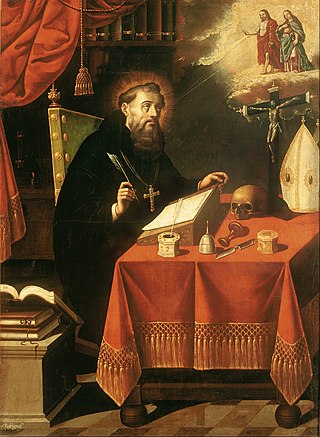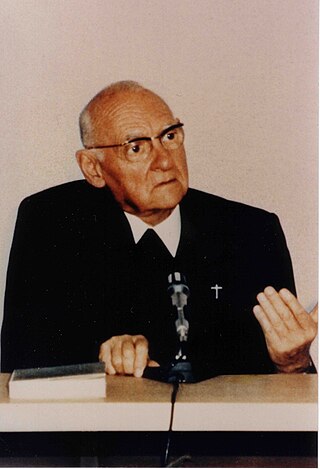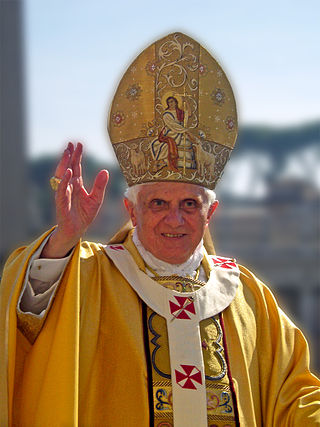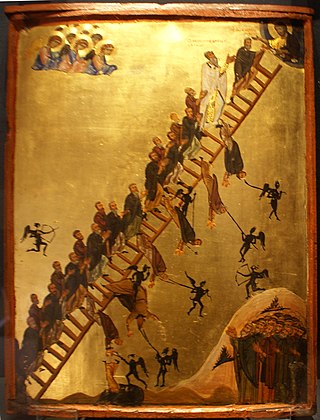Christian eschatology, a major branch of study within Christian theology, deals with the doctrine of the "last things", especially the Second Coming of Christ, or Parousia. Eschatology – the word derives from two Greek roots meaning "last" (ἔσχατος) and "study" (-λογία) – involves the study of "end things", whether of the end of an individual life, of the end of the age, of the end of the world, or of the nature of the Kingdom of God. Broadly speaking, Christian eschatology focuses on the ultimate destiny of individual souls and of the entire created order, based primarily upon biblical texts within the Old and New Testaments.

Pope Benedict XVI was the head of the Catholic Church and sovereign of the Vatican City State from 19 April 2005 until his resignation on 28 February 2013. Benedict's election as pope occurred in the 2005 papal conclave that followed the death of Pope John Paul II. Benedict chose to be known as "Pope emeritus" upon his resignation, and he retained this title until his death in December 2022.

Amillennialism or amillenarism is a chillegoristic eschatological position in Christianity which holds that there will be no millennial reign of the righteous on Earth. This view contrasts with both postmillennial and, especially, with premillennial interpretations of Revelation 20 and various other prophetic and eschatological passages of the Bible.

Georg Ratzinger PA was a German Catholic priest and musician, known for his work as the conductor of the Regensburger Domspatzen, the cathedral choir of Regensburg. He was the elder brother of the Pope Emeritus Benedict XVI. Their grand-uncle was the German politician Georg Ratzinger.

Hans Urs von Balthasar was a Swiss theologian and Catholic priest who is considered an important Catholic theologian of the 20th century. Pope John Paul II announced his choice of Balthasar to become a cardinal, but he died shortly before the consistory. Cardinal Joseph Ratzinger said in his funeral oration for Balthasar that "he is right in what he teaches of the faith" and that he "points the way to the sources of living water".

The theology of Pope Benedict XVI, as promulgated during his pontificate, consists mainly of three encyclical letters on love (2005), hope (2007), and "charity in truth" (2009), as well as apostolic documents and various speeches and interviews. Pope Benedict XVI's theology underwent developments over the years, many of which were characterized by his leadership position in the Congregation for the Doctrine of the Faith, which is entrusted with preserving the Catholic faith in its entirety.
The early life of Pope Benedict XVI concerns the period from his birth in 1927 through the completion of his education and ordination in 1951.
"Roman Triptych: Meditations" is a forty-page poem by Pope John Paul II, composed of three parts: Stream, Meditation on the Book of Genesis, and A Hill in the Moria Land. Originally written in John Paul II's native Polish after a visit to his homeland of Poland, the poem was translated to Italian by Grażyna Miller, and published in 2003 simultaneously in Poland and the Vatican.

In Christian eschatology, the Four Last Things or four last things of man are Death, Judgment, Heaven, and Hell, the four last stages of the soul in life and the afterlife. They are often commended as a collective topic for pious meditation; Saint Philip Neri wrote, "Beginners in religion ought to exercise themselves principally in meditation on the Four Last Things." Traditionally, the sermons preached on the four Sundays of Advent were on the Four Last Things.
The Paschal mystery is one of the central concepts of Catholic faith relating to the history of salvation. According to the Compendium of the Catechism of the Catholic Church, "The Paschal Mystery of Jesus, which comprises his passion, death, resurrection, and glorification, stands at the center of the Christian faith because God's saving plan was accomplished once for all by the redemptive death of himself as Jesus Christ." The Catechism states that in the liturgy of the Church "it is principally his own Paschal mystery that Christ signifies and makes present."
The Catholic University of America Press, also known as CUA Press, is the publishing division of The Catholic University of America. Founded on November 14, 1939, and incorporated on July 16, 1941, the CUA Press is a long-time member of the Association of University Presses. Its editorial offices are located on the campus of the Catholic University of America in Washington, D.C. The Press has over 1,000 titles in print and currently publishes 40 new titles annually, with particular emphasis on theology, philosophy, ecclesiastical history, medieval studies, and canon law. CUA Press distributes books on behalf of Sapientia Press of Ave Maria University, books of the Franciscan University of Steubenville Press, Humanum Academic Press of the John Paul II Institute, and for the Academy of American Franciscan History. CUA Press also publishes books under its Catholic Education Press imprint.

Inaugurated eschatology is the belief in Christian theology that the end times were inaugurated in the life, death and resurrection of Jesus, and thus there are both "already" and "not yet" aspects to the Kingdom of God. George Eldon Ladd suggests that the Kingdom of God is "not only an eschatological gift belonging to the Age to Come; it is also a gift to be received in the old aeon."

The Pope Benedict XVI bibliography contains a list of works by Pope Benedict XVI.
The Ratzinger Foundation, also known as The Pope Benedict XVI Foundation, is a charitable organization whose aim is "the promotion of theology in the spirit of Joseph Ratzinger." which it achieves by funding scholarships and bursaries for poorer students across the world. The foundation was launched on the initiative of former students of Joseph Ratzinger in December 2007.
In a religious context, transfiguration, from Latin transfiguratio, is the experience of momentary divine radiance. It can function as a form of apotheosis.

The Ratzinger Report is a 1985 book consisting of a series of interviews collected over several days given by Joseph Cardinal Ratzinger to the Italian journalist Vittorio Messori. The book focuses on the state of the Roman Catholic Church after the Second Vatican Council. The book is very critical of the "hermeneutic of rupture" associated with the liberal "spirit of Vatican II" within the Church. It has often been reread in the context of the papacy of Pope Benedict XVI in order to better understand the mind and the thinking of the former pontiff.

Truth and Tolerance is a book written by Joseph Cardinal Ratzinger.

The Spirit of the Liturgy is a 2000 book written by Joseph Ratzinger before his ascension to the papacy. Ratzinger called for the return to the historical practice of the liturgical orientation towards the east - the ad orientem Mass, where this is not possible, he calls for the placement of the Crucifix in the center of the altar.

Eternal life traditionally refers to continued life after death, as outlined in Christian eschatology. The Apostles' Creed testifies: "I believe... the resurrection of the body, and life everlasting." In this view, eternal life commences after the second coming of Jesus and the resurrection of the dead, although in the New Testament's Johannine literature there are references to eternal life commencing in the earthly life of the believer, possibly indicating an inaugurated eschatology.
Salvator Attanasio was an American literary translator, who translated over 200 works of literature, history and philosophy.














